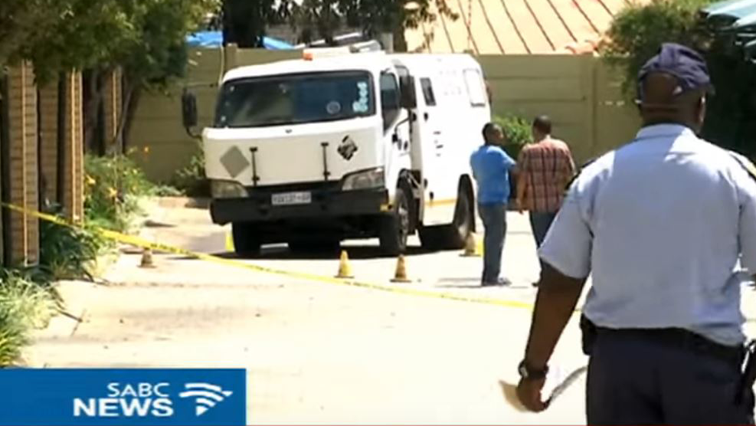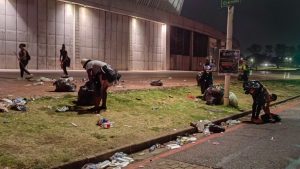A female police officer in Limpopo, who is allegedly romantically involved with a cash-in-transit (CIT) heist kingpin, has been arrested and fired for giving the suspect a car to escape. It has also been revealed how cash-in-transit suspects hijacked the sister of a security guard who refused to co-operate with them.
These were some of the issues that emerged during a meeting between Parliament’s Police Committee and stakeholders, such as the South African Banking Risk Centre (Sabric), the Private Security Industry Regulatory Authority (PSIRA), and the South African Reserve Bank, on how to curb cash-in-transit heists.
Collusion and the involvement of some police and security employees came under the spotlight.
Police Minister Bheki Cele revealed how a Limpopo constable found herself on the wrong side of the law for allegedly assisting her kingpin lover to escape during an arrest.
“We have arrested three last night in Limpopo. We arrested one of ours who provided an escape car just last night and is romantically involved with a kingpin of a cash heist. So these are the things internally but it looks that in all other groups that we arrested, we have a member of the private security company.”
The National Police Commissioner, Khehla Sitole, added that the constable has been fired.
“The minister has just indicated the female constable is involved with a kingpin. My instruction was cut and dry, summary dismissal. She is no longer in the organisation. That’s just my principle approach. So if anyone is involved in crime is no longer with use. We take our uniform away, the orange uniform is available.”
Former KwaZulu-Natal Hawks Head, Johan Booysen, who is now the Head of Security for the Fidelity Security Group, elaborated on the lengths criminals would go to secure the guards’ co-operation.
“In the Eastern Cape we are sitting with a situation where one of the Fidelity drivers successfully defended an attack. He managed to wound one of the perpetrators and a month later they paid him a visit at his house and traced him and they said we are coming against you but this time you are not going to defend because the money is not yours. They brought crime intelligence on board. Subsequently because he does not want to collude with them and now they have abducted his sister to try and force him collaborate with the robbery.”
Business Against Crime South Africa says it wants to help government to root out cash-in-transit heists. Acting Chief Executive Officer, Billy Graham, says heists have a negative impact on the economy and the livelihood of South Africans.
“Chairperson and colleagues, Business Against Crime is willing and ready to work with government and the private sector in this fight against crime because we need and we understand that the efforts need to be stepped up. There are too many lives lost. The effect on the economy is just too large. The negative effect on employment is just unacceptable and we need to work together to ensure that we stabilise this society in our country where people have employment and the economy can grow and our role is to wait for your request to assist you in this.”
On the issue of strategies and solutions to the problem, the South African Reserve Bank’s Deputy Governor on Financial Stability and Currency, Francois Groepe, says more research is required to establish what kind of currency protection devices should be used in the cash vehicles. He says devices used at ATMs have proved successful and reduced ATM bombings.
“We should also look at industry practices because the reality is that there are CPD devises that are utilised in CIT vehicles. But often these devises are of poor quality for example, leakage or they are not fully deployed. And what we need to do is to totally remove the incentive for the criminals. In other words, even if you have a successful CIT attack and you get away with the boxes, you can’t get away with the money and that is why when we have seen significant development in CPD devises for examples employed in ATMs and cross pavement carriers, we have seen decline because the incentive is removed from the criminal elements.”
The Congress of South African Trade Union’s Parliamentary Liaison Offficer, Matthew Parks, raised their proposals to tackle heists.
“A proposal is that workers should be getting into the 40 hours a week with no reduction in the wages. We don’t want a situation where workers are desperate to work 12 hours to catch up with the overtime pay. We don’t think workers should be working the 12 hour shift, given the high security risk of the work.”
Secretary General of the Motor Transport Workers Union, Mthunzi Mabaso says: “We see a lot of guys getting arrested, get out on bail go and commit the same offence. So we are saying yes everyone should be protected by the law. So I think it’s the time that we have to look at these issues and say how do we change these issues. These people need to pay for their eggs.”
More than 150 heists have taken place this year. South African Banking Risk Information Centre’s Head of Service Delivery, Kevin Twiname, says the damage to vehicles alone was costly.
“Forty-nine vehicles referred to in the attacks where explosives were used, those vehicles in fact were a total written off. So at this point in time only cash source and the write off of those vehicles are approximately R64 million just on the damage caused for the vehicles.”
Click below for more on the story:






